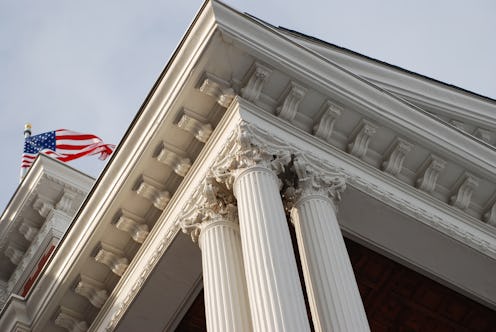News
The Long Road Ahead For The University Of Missouri

After weeks of mounting pressure, University of Missouri President Tim Wolfe resigned Monday morning after failing to address increasing racial tensions on campus. Beginning last month, students have been protesting the lack of action taken after several racial incidents left many feeling unsafe. Since then, the situation has escalated, with one student going on a hunger strike, the football team vowing to boycott team activities, and the faculty threatening to stage a walkout unless Wolfe was replaced. On Monday, students and faculty were granted their wish, but while Wolfe's resignation is a significant first step, the university still has a long way to go to repair the racial fractures that have been allowed to form.
On Monday morning, during a special meeting with the school's governing body, the Board of Curators, Wolfe announced:
I am resigning as president of the University Missouri system. ... I take full responsibility for the actions that have occurred. I have asked everybody to use my resignation to heal. Let's focus in changing what we can change today and in the future, not what we can't change in the past.
Indeed, the University of Missouri will have to focus substantial energy on healing and changing. Wolfe's resignation is essentially an acknowledgment of the problem, and while it may be a watershed moment for the school, it's nothing more than a symbolic gesture. The real change has yet to begin.
But before getting into what that change will look like, let's review the background and what led to Wolfe's resignation. It all started when the university's student government president, who is black, said that a group in a pickup truck drove by and shouted racial slurs at him last month. Then, a few days before the Homecoming Parade, members of a black student organization said an apparently intoxicated white student shouted racial slurs at them. Then, students found a swastika made with feces in a dormitory bathroom. These were just three reported incidents of an increasingly hostile campus environment that students say started worsening after the Ferguson shooting.
On Monday, leaders of the student government said in a letter:
In August 2014, the University of Missouri met the shooting of Michael Brown with silence. In the following months, our students were left stranded, forced to face an increase in tension and inequality with no systemic support. Over the last 16 months, the quality of life for our students has only worsened.
In order to mend the cracks that have been neglected and left to form over the last year, and perhaps beyond, the university will have to take several concrete steps now. The day before his resignation, Wolfe addressed a new proposal for promoting tolerance on campus. Included in the plan was increased diversity training for students, faculty, and staff.
Student organization Concerned Student 1950, who has been spearheading the protests on campus, also called for a 10 percent increase in black students and faculty by the 2017-2018 academic year and for all future University of Missouri presidents and chancellors to be elected by a "collective of students, staff, and faculty of diverse backgrounds."
In addition to cultivating more diversity, the university will have to heighten its nondiscrimination policies and implement strict zero-tolerance punishments for those who discriminate or harass someone on the basis of race. For incidents like the ones students reported in the last few weeks, perpetrators should face automatic expulsion after a comprehensive review process.
Furthermore, if its lack of response to Ferguson taught the school anything, it's that engaging in such a crucial public discourse sets an important example for those who are preparing to enter the real world. When the University of Missouri failed to respond to Ferguson, it also failed its African American students and any other minority students who have experienced racism. Whether it's racial injustice, sexual harassment, or any other form of discrimination, the university needs to send the message that it cares about the basic civil liberties and human rights of all, no matter where in the world. It is, after all, the same world they will send their students into one day.
Image: saxcubano/Flickr